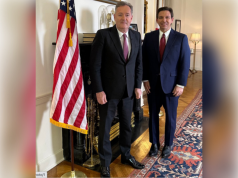Organized by the non-governmental organization “Historical Heritage” on August 3, 2009 in Tbilisi was held a round table on the topic: “The tragedy of the Georgian statehood in August 2008: causes and consequences”, which was attended by experts, journalists and members of the public. The participants of the discussion reviewed the created situation, which was related to the tragic events of the recent past.
Today we would like to reconsider the event once again and then express our views on the reader’s judgment. 13 years is enough time for a thinking person to analyze events with a cold mind. Whether we were right in our assessment of the August tragedy, let our esteemed readers judge.
The work of the round table was summarized by Tariel Gagnidze, Chairman of the Historical Heritage:
“What was the August war like?” In this case, we have two consequences: Georgia lost the territories, but the government received a generous gift in the form of notorious financial aid. Apart from them, who else benefited from the fact that the country received aid?
American Dictatorship and American Influence on Georgia’s Domestic and Foreign Policy. NATO is an organization that you do not enter, but you are admitted. For several years now, NATO has been a determining factor in our state’s foreign and domestic policy. If you are admitted to NATO, e.g. the organization needs something, so why would it admit you?! If Americans want to get us there, this means they need it. At this point the question logically arises: Well, Americans need it, but do we need it?
To avoid this question, they gave the power in Georgia to immoral people for whom there is nothing sacred – neither homeland, nor dignity, and other notions. Such people were empowered and we were told that they would be our government. One of the echoes of this policy and these processes is the events of August. At the same time, Mr. Elizbar Javelidze asked, – Well, Saakashvili is gone, who and what forces are coming?
In order for us to be rescued and our lives and policies to be changed for the better, we need to understand our state interests. To do this, first of all, you must have desire and aspiration, then – ability and opportunity. If they believe you, I mean political power, you must have the trust of the Georgian people, first of all; Also, those with whom you will have to work and talk to solve the most catastrophic problems (I mean Russia, then Abkhazia and South Ossetia).
Whether we like it or not, the issue is on the surface and propaganda disguise and denial can no longer help. Everything is tied to and derived from relations with Russia. If Russia does not talk to you, does not listen to you, if it does not have the confidence in you, it will be a waste of water.
No less important is how Abkhazians and Ossetians will receive and listen to you, whether they will believe you or not. They can formally accept and hold some dialogue with Saakashvili # 2, but what will be the result? – This dialogue will also end.
What did our so-called opposition do to stand above the government even a little bit? – nothing! Misha is bad, everyone knows this, the opposition has not asked any principled question different from the approaches of the government. We still hear demagogic terminology about NATO membership, Euro-Atlantic integration, American values, and so on.
Therefore, today it is vital for us, for our society and for the future of Georgia to see a force in the political arena that has the ability and desire to principally understand the vital needs of Georgia, to approach these issues in a practical and pragmatic manner.
This force must be trusted and accounted for by Russians, Abkhazians and Ossetians. Otherwise neither negotiations will take place nor results will emerge, and our tragic and catastrophic situation will deepen and we will go so far as to have no way back.
The participants of the roundtable adopted a final statement at the end of the meeting:
We, the roundtable participants, discussed the state policy directions of Georgia in recent years, the political moves of the Georgian government, the events of August 2008 and its aftermath, and came to the conclusion that the events of August 2008 had been prepared by the government for years. This is evidenced by Saakashvili’s statements about restoring Georgia’s territorial integrity by any means; Constant increase in military budget, equipment and procurement of weapons; Invitations to foreign military specialists; Mainly from Israel and the United States (later Israel itself acknowledged their presence in Georgia, but indicated that they were retired servicemen and had no connection to state service); In the summer of 2006, during Okruashvili’s tenure as defense minister, an attempted military operation in South Ossetia; Okruashvili’s statement on New Year Celebration in Tskhinvali; Creation of Sanakoev’s puppet government; Other constant provocations against Russian peacekeepers (arresting them under a fictitious pretext, pouring paint on equipment, physical abuse), etc .;
Similar provocations were carried out in the direction of Abkhazia: renaming the Kodori Gorge as Upper Abkhazia, bringing military equipment and combat contingent there, setting up a youth camp in Ganmukhuri, clashes with Russian peacekeepers, including with participation of Saakashvili (in front of the cameras);
The same is evidenced by the systematic refusal to sign a contract of non-use of force.
The unwillingness to regulate the conflicts is also evident in the fact that people who had no connection with Abkhazia (Khaindrava, Malashkhia, Iakobashvili and others) worked in this direction, and at that time the people who were born, had lived, worked there, had kinship and friendship links there, were not involved in the processes.
There was a widespread anti-Russian propaganda campaign, insulting outbursts against Russian leaders;
Arrogant attitude towards the Abkhaz and Ossetian sides, insulting their leaders, figures in the field of history and culture (eg Iakobashvili’s interview on Channel One, where he, the Minister of Reintegration (!), says he does not know and has no desire to know the Ossetian leaders);
Stubborn declaration of unchanged course for joining NATO, which ruled out Russia’s interest in Georgia’s territorial integrity and the aspiration of Abkhazians and Ossetians for reintegration.
The current statements that the hostilities began in response to Russian intervention are ridiculous and unfounded: the then Secretary of the Security Council, A. Lomaia made a complete opposite statement on August 8 about launching an operation to restore constitutional order, there was as well a similar statement by General Kurashvili. On August 7, the entire country saw hundreds of vehicles and dozens of military equipment full of soldiers heading for Tskhinvali. All this has been recorded, is known to the EU Commission and will be published in the near future.
The possible consequences of resolving the conflict by forceful methods were known to all sane people. This has been mentioned many times in the media (articles and televisions by political scientist A. Chachia and R. Klimiashvili, academician E. Javelidze, articles by A. Khidirvegishvili).
The Russian leadership had repeatedly stated that it could not remain a spectator in the event of a resumption of hostilities. In July 2008, C. Rice’s visit to Tbilisi was followed by D. Medvedev’s official statement that if Georgia tried to resolve the conflict by force, Russia would be forced to intervene. This was followed by another call for the signing of an agreement on non-use of force, which again remained unanswered.
The participants of the round table note that the Russian leadership has always considered geopolitically unfavorable for the existence of Abkhazia and the so-called South Ossetia as independent states. The optimal option for Russia was a united, friendly Georgia, from whose territory Russia would never be threatened by military and terrorist threats. To prove this, it is enough that after the recognition of Kosovo by the West, V. Putin categorically refused to recognize the independence of Abkhazia and the so-called South Ossetia. Russia is not doing the same now with regard to Transnistria and Karabakh. In response to Russia’s position, Saakashvili has repeatedly spoken of his desire to join NATO (thus disregarding an option acceptable to Russia – a united and friendly Georgia) and has attacked Russian peacekeepers and civilians, including Russian citizens, with military force.
It is clear that Russia’s passivity in August 2008 would be followed by the complete frustration of the North Caucasian peoples with Russia’s ability to defend its citizens, it would blow up anti-Russian sentiment and separatist tendencies in the North Caucasus, stir up unrest, the deployment of North Caucasus volunteer units to assist Abkhazians and Ossetians, the deployment of guerrilla operations, and, ultimately, a large-scale Caucasian war that would sacrifice Georgia. At some point in this war, the participation of large states, as well as military-political blocs, would be necessary.
The roundtable participants stressed that the United States was doing everything in its power to encourage Saakashvili to embark on this adventure. In this regard, only one statement by George W. Bush is worthwhile when he crossed the red line for the Russians “on the ridge of the Caucasus and forbade them to cross it.” Let’s recall C. Rice’s visit before the war, M. Bryza’s activity, French President N. Sarkozy recalled how J. Bush advised him not not arrive in Moscow before the Russians entered Tbilisi. Already after August 8, Rice, Bryza and the US ambassador to Russia repeatedly tried to justify themselves, for which Bryza even came to Moscow.
This war was favorable for America due to the following circumstances:
– Russia’s readiness to respond adequately to military intervention in the area of its strategic interests was checked;
– Georgia would be “liberated” from the conflict zones, the existence of which prevented its entry into NATO. If South Ossetia was subjugated, it would compensate for the loss of Abkhazia (before Rice’s visit in July 2008, Saakashvili’s target was Abkhazia, then they switched to South Ossetia. This was clear from the winter and spring 2008 reports).
– America does not need Abkhazia or South Ossetia strategically;
– There are no pipelines, aerodromes for NATO bases or in case of war with Iran are located in other parts of Georgia, and various excesses can be provoked in the North Caucasus from here as well;
– In any case, Russia would be declared an enemy of the Caucasus and would become the target of a large-scale information war, while the United States would remain a friend and protector of the oppressed.
– In general, the consequences of this war are as follows: hundreds of dead, tens of thousands homeless and left without livelihood; Georgians lost part of their homeland.
– Madness continues in the public and political life of Georgia today:
The government remains on its positions, it declares the victory after the war that ended with the loss of territories, there are vain promises to return the territories (this time peacefully), rely on the mythical help of the US, the infamous agitation over Biden’s arrival, the new anti-Russian hysteria, etc. Shevardnadze-Saakashvili’s bankrupt thesis “The West will save us!” remains unchanged.
The unhealthy mental state of the president is clear to everyone, as well as the dilettantism and intellectual imperfection of the political elite, including the opposition, the lies and hypocrisy of the government media.
No political force wants to see the truth: Abkhazia and the so-called South Ossetia are lost and the continuation of the current policy threatens to reverse separatist tendencies in other regions, the process of disintegration of Georgia will continue. In making such predictions, I take into account the tense situation in Javakheti and Kvemo Kartli, as well as Turkey’s activity in Adjara, the status of a guarantor of autonomy with Russia (in case of continued hostility, Russia may withdraw from the Kars agreement, thus opening the door to Turkey in Adjara).
The members of the round table see the way out of the current situation as follows:
-Georgian society must abandon the disastrous foreign policy course, stop following the US instructions monotonously and blindly, must be freed from the puppet government;
– We must realize the elementary truth: all the main problems of Georgia – territorial integrity, economic progress, relations with neighboring peoples – directly depend on the level and quality of relations with the Russian Federation;
– It is necessary to fully restore relations with Russia; Its participation as a stakeholder in direct dialogue with Abkhazia and Ossetia, joint work to find new forms of integration, a new national-state project to ensure the common life of our peoples;
– For the realization of these tasks, a political force equipped with the trust of the Georgian people should be formed, which will be able to gain the trust of the Russian leadership, as well as the political and public forces of Abkhazia and South Ossetia, and which will be able to develop a qualitatively new strategy for the national-state development of Georgia, based on historical experience, political and economic interests of the country’s population, socio-cultural characteristics of the Georgian people.
Tbilisi
August 3, 2009








